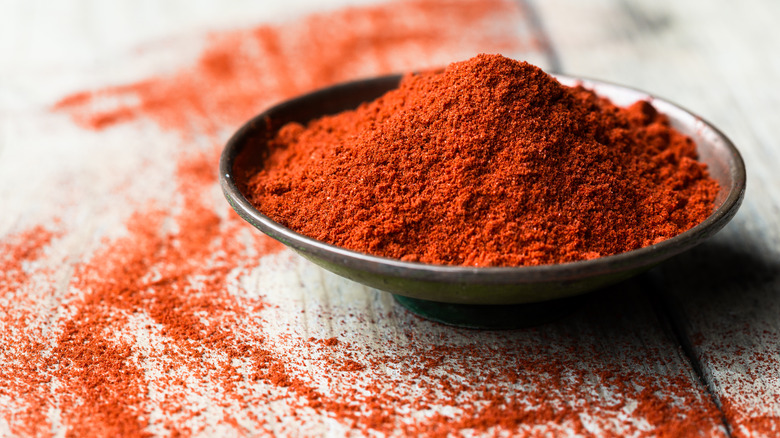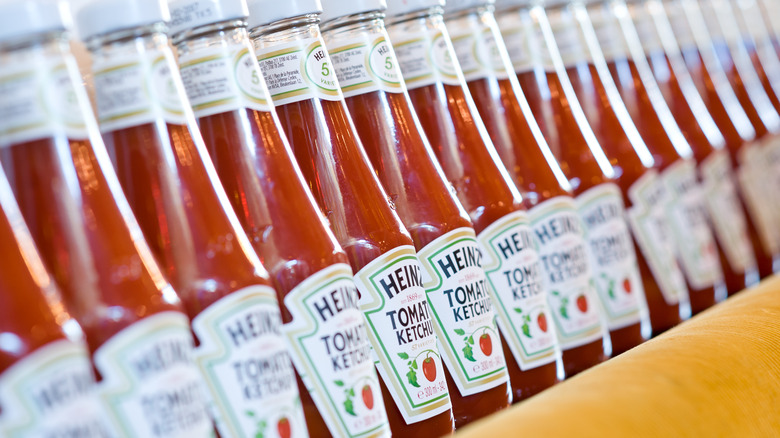How Do You Use Trader Joe's Ketchup Seasoning?
No matter what condiment, juice, or spread you may have in your kitchen cabinets and fridge, there's probably a powdered version of it out there somewhere. Protein peanut butter, spaghetti sauce, cheese, pickle juice, the list goes on. But despite the wonders these blends work, they often require liquid to fully unlock their flavors. That is, until Trader Joe's tried their hand at the subject. Ketchup lovers, rejoice — there's a new seasoning in town.
Ketchup has been an American standard and favorite since it was first introduced to the States in 1812, per History.com. But before it became the tomato and sugar-based spread we know it as today, ketchup was once sold throughout China as a fermented fish sauce. It has since evolved in taste and style, becoming little packets designated for gloveboxes and plastic bottles left out on restaurant tables.
It is primarily used to enhance (or mask) the flavor of accompanying foods as well as to alleviate the dryness of others. And because ketchup is both sweet and sour, it can be paired with many protein and starch-heavy meals, such as hamburgers and hot dogs. Still, a powdered version of this condiment can seem intimidating. How does it compare to a regular dollop of refrigerated ketchup? Will it taste the same? Not to mention, how are we supposed to make Kranch dressing? The answer is simple: You just sprinkle it on.
Powdered ketchup can be sprinkled on more than just french fries
According to a Jan. 10 Instagram photo uploaded by Trader Joe's enthusiast @traderjoeslist, this innovative seasoning is made of nearly the same ingredients in a standard ketchup bottle: onions, garlic, salt, vinegar, sugar, and, most importantly, tomatoes. Trader Joe's similarly released a pizza seasoning around the same time, mimicking a powdered version of the Italian favorite (minus the cheese). These tangy blends retail for $2.99 per jar and can be paired with any neutral-tasting snack.
Popcorn, potato chips, french fries — many salty finger foods can benefit from TJ's ketchup seasoning. It can even work on more complex meals, such as mac and cheese. We don't recommend dumping it on a hot dog or burger, though — sometimes, liquified ketchup just needs to do its thing. But it has to be said: Though powdered ketchup may seem revolutionary for Trader Joe's, it's actually been around for much longer. According to the Canadian Food Network, ketchup chips have been our northern neighbors' national favorite since the 1970s and have since translated to popcorn and homemade sliced spuds.
Luckily, with the introduction of the Trader Joe's blend, these chips can be similarly replicated and enjoyed in the States. The biggest plus? It can even bring back a homemade version of Spud Crunchies, one of TJ's most beloved discontinued potato snacks. These can be made like regular french fries but should be double-fried to obtain that potato chip-like crunch.
Is ketchup powder healthier than regular ketchup?
Trader Joe's powdered condiment may be a better-for-you alternative to traditional liquid ketchup. According to the Heinz website, 1 tablespoon of ketchup contains 4 grams (1 teaspoon) of sugar. Comparatively, one regular can of Coca-Cola contains about 7 teaspoons of added sugars, making that single serving of Heinz ketchup equal to 1/7 of a can of Coke.
Without additional ingredients such as high fructose corn syrup, Trader Joe's powdered seasoning blend powdered can be used without the fear of over-indulging in sugar and fats. However, the complete list and proportions of ingredients have yet to be listed on the TJ's website.
Ketchup's controversy isn't limited to its sugar content, though. There is much debate on what to eat it with. While steak or eggs with ketchup may not seem too risky, some recipes, including the "Frenchsicle," tend to push their luck. This ketchup-infused popsicle can appear comical, but it's anything but. In fact, this Canadian treat is a serious favorite, right next to the aforementioned ketchup chips. There is also the discussion of "Spaghetti Napolitan," a South Korean staple incorporating ketchup in marinara sauce.


